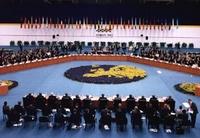SKOPJE, Macedonia -- As unpleasant as it may be for Europe to hear, the stabilization of the Balkans during its painful transition in the 1990s was made possible by the United States. Although America initially stayed out of the conflicts that followed the dissolution of Yugoslavia, the fighting ultimately stopped only after President Bill Clinton summoned the warring parties to Dayton in 1995. When Kosovo started looking like the next chapter in the region's bloody history, it was again the U.S. that took decisive action, with Europe happy to support Washington's lead. And finally, the U.S. made the final call to recognize Kosovo's independence last year, facing down Russia along the way, even if most of the EU member states subsequently followed suit.
Obama and the Balkans: What Kind of Multilateralism?

